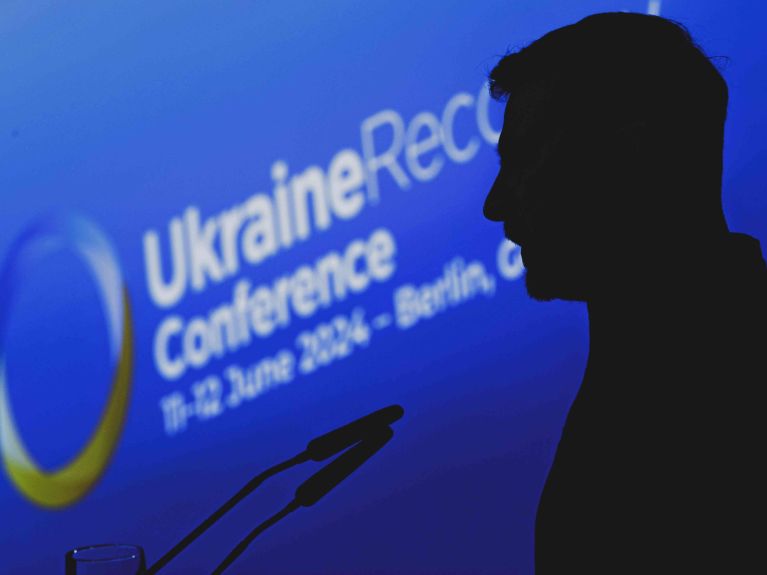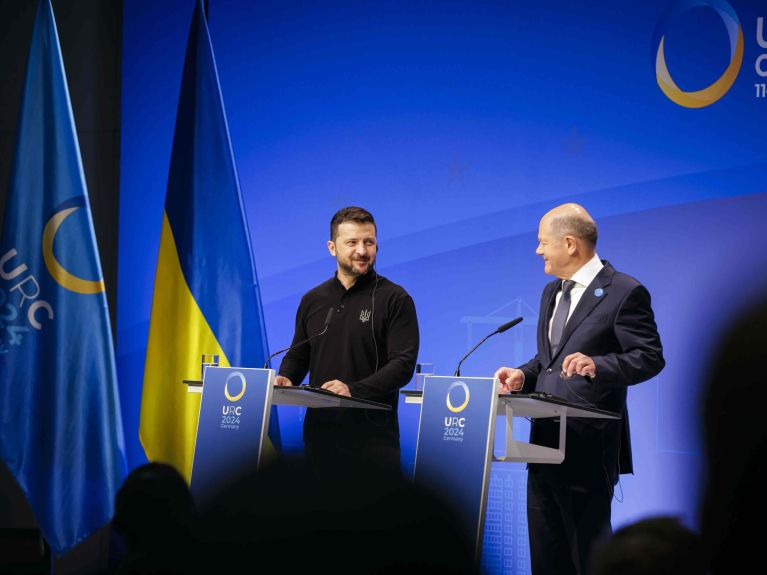Investing in the future
In addition to military support options, the Ukraine Recovery Conference 2024 is also looking into the economic requirements for reconstruction and recovery.

Penny Pritzker is the US Special Representative for Ukraine’s Economic Recovery. On the first day of the Ukraine Recovery Conference 2024 (URC 2024), organised by the Federal Foreign Office and the Federal Ministry for Economic Cooperation and Development, she took part in a panel to discuss the economic basis required for the recovery of the war-torn country. In his opening speech, Federal Chancellor Olaf Scholz said recovery would be very difficult to achieve without the commitment of the private sector. “Given the scale we’re talking about, private capital will have to come into play,” Scholz said. Otherwise, Scholz continued, it would be virtually impossible to meet the enormous financial requirements of 500 billion US dollars (464 billion euros) in reconstruction aid – the sum that the World Bank estimates will be needed over the next ten years.
Pritzker said she agreed, but as a former entrepreneur herself, the US politician said she knew exactly what was going through the minds of many of the business representatives present. “You might be wondering now: why I should invest in Ukraine of all places? I don’t think my money will really be safe there.” Initially it might seem that way, Pritzker continued, but only at first glance. “In reality, this is a huge opportunity for all of you.”
Improving the conditions for investment
This is not just about the raw materials that the country possesses or its impressive industrial production capacity, but also the Ukrainians’ will to reform their own economy and move closer to the EU’s standard of living. The reforms already implemented in the country were praised several times, especially in view of the difficult conditions of the ongoing Russian war of aggression. As a result – and in the presence of Ukrainian President Volodymyr Zelenskiy – EU Commission President Ursula von der Leyen also spoke in favour of engaging in membership talks with Ukraine as soon as possible.

In addition, the supporting countries are very keen to create the conditions for a favourable investment environment. A newly founded Business Advisory Council is to provide support for entrepreneurs from donor countries who wish to invest in Ukraine in future. “This is firstly about meeting acute needs such as in the areas of defence and energy, but in the medium and long term it’s also about establishing structures and providing skilled labour,” said Christian Bruch, CEO of Siemens Energy and chair of the new advisory council.
New skilled labour alliance
In future, Ukraine will receive special support in recruiting skilled labour through the Skills Alliance for Ukraine, which was presented at the conference by Development Minister Svenja Schulze. Made up of more than 50 international organisations, countries and companies, this alliance is looking to train and support a total of 180,000 skilled Ukrainian workers over the next three years. The initiative is primarily aimed at young people, internally displaced persons and women. “By doing this we’re providing vital support to Ukraine for wartime reconstruction,” said the Minister. “No matter how often Russia destroys power lines, hospitals or buildings, the Ukrainians will have the knowledge and skills to rebuild them.”
Another key issue at the conference will be new agreements on military support for Ukraine. Ukrainian Economics Minister Yulia Svyrydenko went straight to the point: one of the most effective measures to promote Ukraine’s economic strength and therefore its recovery was an effective air defence system, she said. “People are our most important economic resource. And they have to be protected from Russian bombs.” President Volodymyr Zelenskiy thanked his host Olaf Scholz several times for the help his country had received in defending itself against Russian missiles and drones. “Right now, air defence is everything.”
Aid for Ukraine in the energy sector
One of the primary targets of the Russian armed forces is the energy infrastructure. Zelenskiy said that nine gigawatts of power had already been lost due to bombs: 80 per cent of heat production and 30 per cent of hydropower. The conference will also focus on initiating concrete partnerships dedicated to the reconstruction of a resilient energy infrastructure. On one of her trips to Ukraine, Foreign Minister Annalena Baerbock was able to see the devastating effects of the destruction wrought in this area for herself, as she reported. “I saw the destruction caused by over 80 missiles and drones at Trypillya thermal power plant – once a lifeline for three million people, now in ruins.”
How are the Ukrainians holding up? Foreign Minister Dmytro Kuleba trusts in the perseverance of his compatriots. As he told on one of the opening panels. he met a young man on the street some time ago who was going to emigrate because he didn’t believe his country could recover from the damage. “So I said to him: look at what Europe was like after the Second World War. The destruction was far worse. And yet the people managed to do it.” He saw the man again after a while. “I was surprised and asked him why he was still there... ‘You're right,’ he replied. ‘It was much worse in Europe. That means we can do it, too.’”


